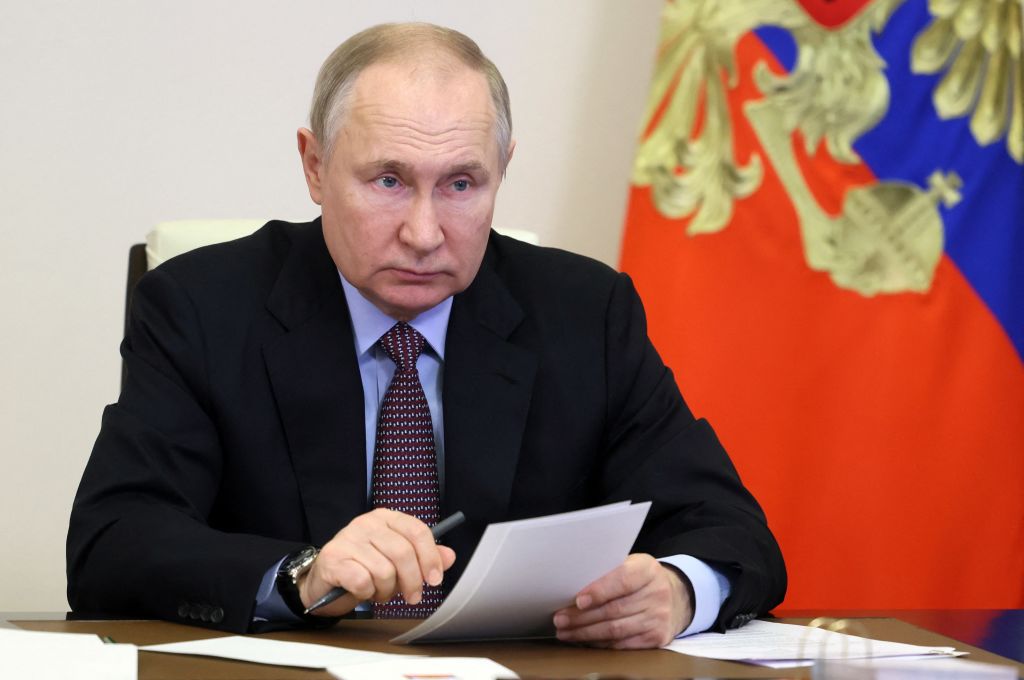December is usually a busy month for Vladimir Putin, but not this year. In the run-up to Christmas, Russia’s president typically holds his annual press conference. But this time the event has been cancelled. Putin’s annual presidential address to the Russian federal assembly – that was pushed back from the summer – has also been canned. And Putin will also be absent from the traditional New Year’s Eve ice hockey game on Red Square. Putin’s yearly telethon, where ordinary Russians can phone in and have a chat with the president (indefinitely postponed from earlier in the year), too has been axed.
Such events in the Kremlin calendar are annual touchstones for Putin to ‘connect’ with the Russian people. They are highly-orchestrated pieces of televised theatre, of course, but in the absence of free and fair elections they allow a veneer of authenticity and integrity to remain in the relationship between Putin and his people.
Instead Putin is keeping a low profile. Rather unsurprisingly, this shyness has plenty to do with Russia’s invasion of Ukraine. It appears Putin, increasingly immured in the echo chamber of the Kremlin, doesn’t want to be ambushed with any awkward questions about the war. The destruction of the Kerch bridge in Crimea, the retreat from Kherson in November and various Ukrainian drone strikes on air bases inside Russia mean there is plenty of difficult topics Putin might have been quizzed on. How Putin could answer such without contradicting the reams of propaganda the Kremlin has spent months painstakingly pumping out was a conundrum officials saw no easy way to tackle.
Britain’s Ministry of Defence said Putin’s press conference was cancelled because of ‘increasing concerns about the prevalence of anti-war feeling in Russia’. The independent Anglo-Russian newspaper the Moscow Times revealed that the decision to call off the event was made by Putin himself at the last minute. Russia’s leader reportedly made the call after being advised by his security service that it could not guarantee the Ukrainian army wouldn’t launch a major attack in the immediate run-up to the press conference. A similar fear is thought to be behind speculation that Putin’s address to the federal assembly will be kicked into 2023 – something Kremlin spokesperson Dmitry Peskov refused to deny yesterday.
Increasingly immured in the echo chamber of the Kremlin, Putin doesn’t want to be ambushed with any awkward questions about the war
Putin’s decision to cancel his annual press conference – the first time this has happened in a decade – is a sign of how things have changed for the worse for him.
But it is not only the fear of being caught short by awkward questions that led Putin to pull the plug on the event. As is often the case with dictatorships, the cult of personality fostered around a leader requires a need to distance them personally from any bad news when things inevitably start to go wrong. The cult of Putinism is no different. Postponing and cancelling events attended by Putin that have potential to generate bad PR is a curated attempt to make Putin the good news guy: when things go wrong he is determined to dodge the blame.
Putin has reasons to be concerned. As many as 55 per cent of Russians favour negotiating peace with Ukraine, according to a Kremlin poll leaked to the independent Russian newspaper Meduza. A separate survey leaked to the Moscow Times shows that only a quarter of Russians believe the war is going to plan. The wave of protests seen in Russia after Putin’s partial mobilisation was announced in September, the exodus of young men in the months since and the increasing stream of criticism levelled against the Russian army by prominent military bloggers indicate that domestic discord is growing.
It’s true that the Kremlin calendar does list various video engagements for the Russian president in the coming days. There have been rumours, too, that Putin may yet row back and deliver the federal assembly address via video link. But some think Putin’s growing absence from the stage could be cover for something altogether more suspicious.
Abbas Gallyamov, a Russian political analyst and former speechwriter to Putin, who now lives in Israel, took to Telegram last week to make the astounding claim that the Russian president is hatching an escape plan. Citing a Kremlin source he trusted, Gallyamov said that, together with a group of his most loyal cronies, Putin had, since the spring, been making arrangements for ‘Noah’s Ark’, a scheme to evacuate him to South America should his regime collapse.
Argentina or Venezuela are among the likely destinations, according to Gallyamov, although China had also been floated as a safe haven in the early planning stages.‘When [the Kremlin] say that “everything is going according to plan’, it makes sense to clarify which one [ – the plan for the war in Ukraine or Putin’s escape plan]. They seem to have more than one plan,’ Gallyamov said.
It goes without saying that such claims, even from supposedly trusted sources, should be treated with a healthy dose of caution. But that Putin’s absence comes at a time when Russia’s war effort in Ukraine goes from bad to worse is surely no coincidence.







Comments